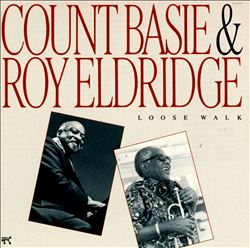Reception
Scott Yanow, writing for AllMusic, said that "[i]ronically, the earliest recording by Count Basie for Norman Granz's Pablo label was one of the most recent to be released." He called it "a set of jammable standards", yielding "quite fun" results. [2]
Nat Hentoff, in his book Listen to the Stories: Nat Hentoff on Jazz and Country Music, wrote that "Elridge is intimately lyrical on I Surrender Dear and sounds like a whip on other tracks." On Basie's playing, he wrote that he "is moved...to break out into some robust stride piano that hadn't been heard from him in years." [4]
This page is based on this
Wikipedia article Text is available under the
CC BY-SA 4.0 license; additional terms may apply.
Images, videos and audio are available under their respective licenses.
